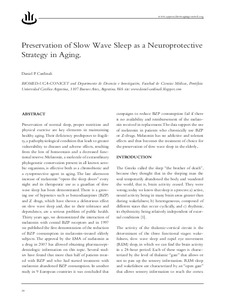Please use this identifier to cite or link to this item:
https://repositorio.uca.edu.ar/handle/123456789/8825| Título: | Preservation of slow wave sleep as a neuroprotective strategy in aging | Autor: | Cardinali, Daniel Pedro | Palabras clave: | MELATONINA; PREVENCIÓN; ENVEJECIMIENTO; BENZODIAZEPINAS; HOMEOSTASIS; TRASTORNOS DEL SUEÑO | Fecha de publicación: | 2018 | Editorial: | Sociedad Española de Medicina Antienvejecimiento y Longevidad | Cita: | Cardinali, DP. Preservation of slow wave sleep as a neuroprotective strategy in aging [en linea]. Approaches to aging control. 2018; 22:39-46. Disponible en: https://repositorio.uca.edu.ar/handle/123456789/8825 | Resumen: | Abstract:Preservation of normal sleep, proper nutrition and physical exercise are key elements in maintaining healthy aging. Their deficiency predisposes to fragility, a pathophysiological condition that leads to greater vulnerability to diseases and adverse effects, resulting from the loss of homeostasis and a decreased functional reserve. Melatonin, a molecule of extraordinary phylogenetic conservation present in all known aerobic organisms, is effective both as a chronobiotic and a cytoprotective agent in aging. The late afternoon increase of melatonin “opens the sleep doors” every night and its therapeutic use as a guardian of slow wave sleep has been demonstrated. There is a growing use of hypnotics such as benzodiazepines (BZP) and Z drugs, which have shown a deleterious effect on slow wave sleep and, due to their tolerance and dependence, are a serious problem of public health. Thirty years ago, we demonstrated the interaction of melatonin with central BZP receptors and in 1997 we published the first demonstration of the reduction of BZP consumption in melatonin-treated elderly subjects. The approval by the EMA of melatonin as a drug in 2007 has allowed obtaining pharmacoepidemiologic information on this topic. Several studies have found that more than half of patients treated with BZP and who had started treatment with melatonin abandoned BZP consumption. In another study in 9 European countries it was concluded that campaigns to reduce BZP consumption fail if there is no availability and reimbursement of the melatonin received in replacement. The data support the use of melatonin in patients who chronically use BZP or Z-drugs. Melatonin has no addictive and tolerant effects and thus becomes the treatment of choice for the preservation of slow wave sleep in the elderly. | URI: | https://repositorio.uca.edu.ar/handle/123456789/8825 | ISSN: | 1885-4028 | Disciplina: | MEDICINA | Derechos: | Acceso Abierto | Fuente: | Approaches to aging control. 2018; 22 |
| Appears in Collections: | Artículos |
Files in This Item:
| File | Description | Size | Format | |
|---|---|---|---|---|
| preservation-slow-wave-sleep.pdf | 520,2 kB | Adobe PDF |  View/Open |
Page view(s)
303
checked on Feb 9, 2026
Download(s)
305
checked on Feb 9, 2026
Google ScholarTM
Check
This item is licensed under a Creative Commons License

